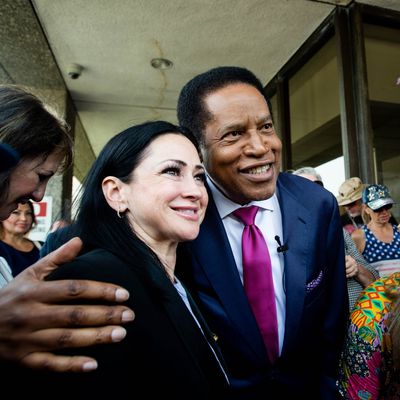
The long-shot Republican effort to recall California governor Gavin Newsom got a jolt of energy last week as popular conservative radio talk-show host Larry Elder joined the field (which officially closed on July 16) of “replacement candidates” who are competing for the job if voters give the incumbent the boot.
But just as Elder got his campaign off the ground, it nearly crashed. When the California Secretary of State’s office released a verified list of qualified candidates on July 18, Elder was not on it, reportedly because he had not (in the secretary of State’s judgment) fully satisfied a requirement of supplying five years of tax returns. Elder’s campaign sued, and on July 21, a Superior Court Judge struck down the entire tax return requirement and restored Elder to the recall ballot. So the race is officially on.
Veteran California political observer George Skelton is among those who think Elder may immediately jump to the top of the nearly 80 candidates who qualified for the second ballot question in the September 14 recall election. (The first is whether Newsom should be removed from office, and the second, which only matters if the first is answered affirmatively by a majority of voters, is who should then become governor):
Elder is well-known among conservatives because his nationally syndicated, three-hour talk show is broadcast daily in L.A., San Francisco, San Diego, Sacramento and several smaller California cities. He’s heard in all 50 states in 200 markets, with a national audience of 1.5 million.
He also has 2.5 million followers on social media.
So he has high California name ID and a national fundraising base. He’s also not exactly a cookie-cutter right-wing gabber; he supported Trump in 2020 but has a libertarian-ish background. And as a longtime Black Republican figure who grew up in South Central Los Angeles, he is neither an opportunist nor a stuffed-shirt country-club type.
Until Elder’s entry into the race, the top Republican replacement prospect was former San Diego mayor Kevin Faulconer, who has a moderate reputation but backed Trump’s reelection. Noisier but less viable Republicans included near-perennial candidate John Cox, who was trounced by Newsom in the 2018 general election. Cox has drawn some attention (and derision) for campaigning with a rent-a-grizzly.
The biggest Republican underachiever in the field is former Olympic and reality-show star Caitlyn Jenner, who infuriated many fellow transgender folk by supporting bans on transgender participation in women’s sports. That position, however, hasn’t won her much love among regular MAGA types, where transphobia is very common. Now comes word Jenner is headed to Australia to appear in a new season of Celebrity Big Brother, and may not make it back to California in time to vote in, much less campaign for, the recall election.
Major Democrats are boycotting the replacement election on grounds that becoming candidates might undermine Newsom’s ability to make the whole thing moot by winning on the first ballot question. That’s still the most likely outcome, given the 2-1 Democratic registration advantage in the Golden State. There haven’t been any public polls in a while, but most earlier surveys showed opposition to the recall holding a comfortable lead. But the incumbent had a small setback when the secretary of State (backed up by a judge) ruled that Newsom’s campaign had failed to file the paperwork necessary to ensure that his party designation appeared on the recall ballot. And George Skelton believes Democratic turnout could lag while Republicans march to the polls for a rare shot at a statewide win (they haven’t had any since 2006):
Organized labor is worried about Democratic apathy.
“There seems to be little appetite to recall the governor. The problem is, people are just not tuned in at all,” says Steve Smith, communications strategist for the California Labor Federation.
Another cloud on the horizon for Newsom is the resurgence of COVID-19 cases in parts of the state, notably in Los Angeles County, which has just reimposed an indoor masking order. His close ally, Lieutenant Governor Eleni Kounalakis, set the recall election date earlier than had been originally expected, presumably to take advantage of good summer vibes over the reopening of the state, as reflected in steadily rising approval numbers for Newsom. It’s possible that could change by September. If so, and Republicans get energized by Elder or just by Newsom’s misfortune, it could get interesting.
This post was updated after Elder was restored to the recall ballot.






























